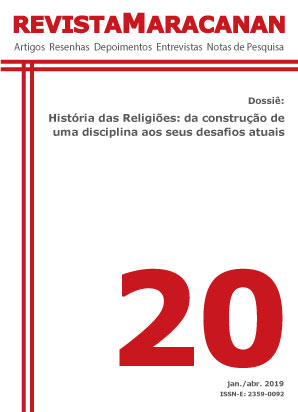The missionary-protestant novel Candida: female authorship and gender relations in the work of Mary Hoge Wardlaw (19th-20th century)
DOI:
https://doi.org/10.12957/revmar.2019.36331Keywords:
Protestant Missions, Brazil, Novel, Feminine ProtagonismeAbstract
Among the numerous writings produced by Protestant missionaries who worked in Brazil during the nineteenth century is a novel published in the United States in the year 1902 titled Candida; or, by a way she knew not. A story from Ceara, which was written by the Presbyterian missionary Mary Hoge Wardlaw. This work of fictional character aimed to demonstrate to its readers the process of insertion of Protestantism in the Province of Ceará in the 1880s. Nevertheless, more than an account of missionary activity, Mrs. Wardlaw's novel was also inserted in a context of broadening the spectrum of female performance in the North American Protestant universe of the late nineteenth and early twentieth century. At this moment several women, through the missionary action and the writing (of memories, letters, novels, etc.) operated a certain feminine protagonism inserted in a network of asymmetric relations of gender, acting constantly in the field of accommodations and cunning. The present article aims to discuss, focusing on the novel of Mrs. Wardlaw, how some women Protestant missionaries in foreign lands - sometimes neglected in studies of Protestantism - acted and expounded their worldviews while they were embedded in a broad and complex set of gender relations, where negotiations and confrontations are not always easy to perceive.
References
ALMEIDA, Jane Soares de. Ler as letras: por que educar meninas e mulheres? São Bernardo do Campo, SP; Campinas, SP: Universidade Metodista de São Paulo; Editores Associados, 2007.
BAKHTIN, Mikhail. Teoria do Romance I: a estilística. São Paulo: Editora 34, 2015.
BENJAMIN, Walter. Magia e técnica, arte e política: ensaios sobre literatura e história da cultura. São Paulo: Brasiliense, 2012.
CHARTIER, Roger (org.). Práticas da leitura. São Paulo: Estação Liberdade, 2011.
CHARTIER, Roger. À beira da falésia: a história entre incertezas e inquietude. Porto Alegre: Ed. UFRGS, 2002.
DAVIS, Natalie Zemon. Culturas do Povo: sociedade e cultura no início da França moderna. Rio de Janeiro: Paz e Terra, 1990.
JORDÁN ARROYO, María V. Sonhar a história: risco, criatividade e religião nas profecias de Lucrecia de León. Bauru, SP: EDUSC, 2011.
KING, Ursula; BEATTIE, Tina (orgs.). Gender, religion and diversity: cross-cultural perspectives. London; New York: Continuum, 2005.
OLIVEIRA FILHO, Sérgio Willian de Castro. Estranho em terra estranha: Práticas e olhares estrangeiro-protestantes no Ceará oitocentista. 2011. Dissertação (Mestrado em História Social) - Universidade Federal do Ceará, Fortaleza.
PAPASHVILY, Helen Waite. All the happy endings. New York: Harper & Brothes Publishers, 1956.
ROBERT, Dana L. (org.). Gospel Bearers, gender barriers: missionary women in the twentieth century. Maryknoll, NY: Orbis Books, 2002.
SCOTT, Joan W. Preface a gender and politics of history. Cadernos Pagu, Campinas (SP), n. 3, 1994. Disponível em: https://periodicos.sbu.unicamp.br/ojs/index.php/cadpagu/article/view/1721.
SCOTT, Joan Wallach. Gênero: uma categoria útil de análise histórica. Educação & Realidade, v. 20, n. 2, jul./dez. 1995. Disponível em: https://seer.ufrgs.br/educacaoerealidade/article/view/71721.
SEVCENKO, Nicolau. Literatura como missão: tensões sociais e criação cultural na Primeira República. São Paulo: Companhia das Letras, 2003.
SILVA, Eliane Moura. Gênero, Religião, missionarismo e identidade protestante norte-americana no Brasil ao final do século XIX e inícios do XX. Mandrágora, São Bernardo do Campo (SP), v. 14, 25-37, 2008. Disponível em: http://dx.doi.org/10.15603/2176-0985/mandragora.v14n14p25-37.
SILVA, Eliane Moura. Missionárias protestantes americanas (1870-1920): Gênero, cultura, história. Revista Brasileira de História das Religiões, ANPUH, ano III, n. 9, 21-40, jan. 2011. Disponível em: http://dx.doi.org/10.4025/rbhranpuh.v3i9.30365.
SILVA, Eliane Moura. Viajantes e missionárias protestantes norte-americanas: narrativas e alteridades na segunda metade do século XIX. In. DIETRICH, Ana Maria et al. Viajantes, missionários e imigrantes: olhares sobre o Brasil. Campinas, SP: Unicamp, 2013.
SINGH, Maina Chawla. Gender, religion, and “heathen lands”: American missionary women in South Asia (1860s-1940s). New York; London: Garland Publishing, 2000.
SOUZA, Sandra Duarte de (org.). Gênero e Religião no Brasil: ensaios feministas. São Bernardo do Campo, SP: Universidade Metodista de São Paulo, 2006.
WIESNER, Merry E. Women and Gender in Early Modern Europe. Cambridge: Cambridge University Press, 2000.
Downloads
Published
How to Cite
Issue
Section
License
The copyrights of originals and translations published are automatically assigned to Revista Maracanan. The information contained in this papers are the sole responsibility of the authors.
The Copyright of the published articles belong to Revista Maracanan, with works simultaneously licensed under a Creative Commons Attribution-NonCommercial-ShareAlike 4.0 International License, which allows the sharing of work with mandatory recognition of authorship and initial publication in this journal, under the same license and for non-commercial purposes.

The Revista Maracanan is licensed with a Creative Commons Attribution-NonCommercial-ShareAlike 4.0 Internacional License.





